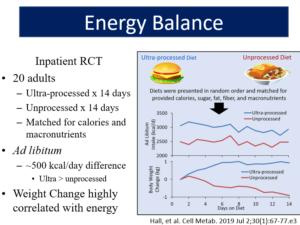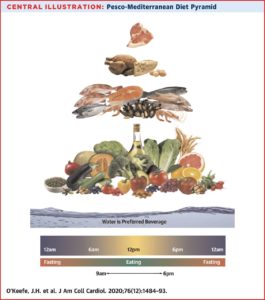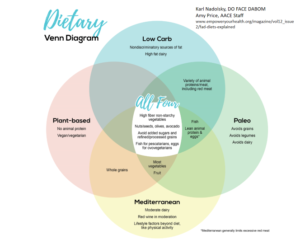The section is aimed at giving simple recommendations for optimizing your lifestyle in order to prevent or help treat obesity-relacted (adiposity-based) cardiometabolic disease which includes atherersclerotic cardiovascular disease (plaques in arteries of your heart, brain, or elsewhere in your body), diabetes or pre-diabetes (the dysfunctional sugar metabolism from insulin resistance or glucose intolerance), and the most common underlying culprit to all of this, visceral fat (the fat in your belly which wreaks havoc on your hormones, blood pressure, blood sugar, cholesterol or lipids, and risk of atherosclerotic disease).
For starters, check out my “War on Obesity & Diabetes,” along with our diet and exercise sections for specific tips.
This section will give an overview of my basic recommendations to almost every patient I see who has any risk for the above diseases and while all specific recommendations are individualized, the concepts of taking small steps toward optimizing your lifestyle can be very simple.
1. Diet
We give all of our patients a description, drawing or handout with our Leaner Living dietary pyramid which encourages increased vegetables (including legumes), lean sources of protein, fruit (but never juice!), a variety of natural fats from WHOLE (avoid adding pure fat, maybe with the exception of some olive oil) sources with proven metabolic health benefits (fish, nuts, olives/avocados, some dairy fat, and even some from dark cocoa and coconut), and roots/tubers or some truly whole grains (like oatmeal and other high fiber sources) depending on the patient’s glucose tolerance. Often the number one step for many patients is to simply cut out sugary soda/juice, which can be replaced by diet versions initially. You must also allow yourself treats, otherwise going on a “diet” can be too restrictive and will back-fire. We don’t focus on caloric load initially, as exchanging empty calorie processed foods for higher fiber or nutrient-dense whole foods will automatically improve energy balance likely helping with fat loss and can be more specifically addressed on a personalized basis.

Ultra-Processed Diets Cause Excess Calorie Intake and Weight Gain: An Inpatient Randomized Controlled Trial of Ad Libitum Food Intake
Kevin D Hall, et al. Cell Metab. 2020 Oct 6;32(4):690.
Overall our dietary recommendations were developed from all the evidence for benefits of plant-based diets, low carb or low glycemic-load diets, and especially Mediterranean-style diets. 
We always suggest personalizing dietary therapy to fit an individual’s lifestyle preferences though adjusting toward a “pesco-mediterranean” pattern is our preferred goal. A recently published proposal articulates similar interpretation of the data in suggesting that dietary pattern with the inclusion of some “time-restricted feeding.”
Regarding the variety of fads and extreme dietary viewpoints, perhaps they share more in common than divides them.
2. Exercise
After assessing every patient’s current activity level, we start trying to add in a daily routine of exercise and increasing what is known as “non-exercise activity thermogenesis” or NEAT. NEAT is just all the activity performed throughout the day which includes standing, walking, using the stairs, cleaning, gardening, and many other aspects of daily life. Stay active! We encourage starting low/slow with daily walks, perhaps pre or post meal walks, and hopefully building up into some higher intensity aerobic exercise. We are strong believers that resistance training is as or more important the aerobic exercise and if performed correctly can actually be aerobic. I spend much time trying to convince patients of all ages and sex that the benefits of resistance training are well worth putting in the effort, and it really does not need to be more than simple exercises. Check out our exercise section for more advice and details on specifics and stay tuned for more detailed explanations and advice.
3. Sleep
The amount and quality of sleep is perhaps the unsung hero of our basic recommendations. Getting 7-8 hours of restful sleep is vital for optimal hormonal health, stress management, and appetite. If you have trouble sleep or perhaps have symptoms of obstructive sleep apnea (snoring, falling asleep during the day) then please discuss this with your physician. Check out our tips on improving your sleep hygiene.
4. Psychology
It is very important to pay close attention to your mental and emotional health in addition to your physical well-being as they are closely tied. Be sure to discuss and potential issues with your physician
5. Beyond lifestyle optimization
There may be other aspects of weight loss (like noted earlier, this is very complicated), vascular disease (heart, brain, other arteries), and diabetes or metabolic syndrome (diabetes or pre-diabetes, belly fat, fatty cholesterol, and high blood pressure) which may need special medical attention and treatment. So always discuss optimizing your disease or disease risk with your physician and treat as necessary!



